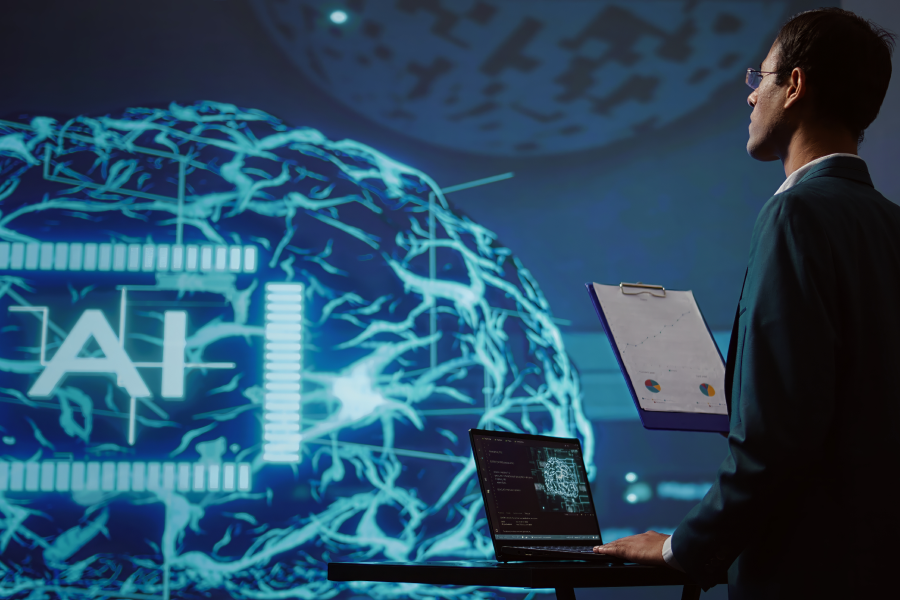The numerous accomplishments that artificial intelligence has enabled the various industries to achieve have put the world on its toes. Artificial Intelligence is getting incredibly sophisticated and efficient at doing what humans do but more quickly, with no errors, and at a much lower cost. While AI has only embarked on its journey in the healthcare industry, one cannot deny that Artificial Intelligence holds great potential in transforming the geography of the health care delivery system. The potential of AI in health care is vast and they are becoming increasingly involved in the healthcare ecosystem. The growth of the industry cannot be predicted so soon but we can definitely say that it is sure to cast a spell over the healthcare industry and can be a prime contributor to the modern care delivery system.
Artificial Intelligence will ensure a massive shift in the paradigm in how patients are treated by the doctor and how they have a huge amount of data saved in their mind and paper which may lead to an error. AI can be put to use for a considerable amount of work and make the functioning of the care delivery system more organized and seamless. The traditional analytic methods used in health care has been revamped with a more clinical decision-making technique using volumes of data that enables decision-makers to gain unparalleled insight while deciding treatment variability, diagnosis, planning the care process, and lastly the patient outcome. A recent study also suggests that the key application in health care can also create a saving of $150 billion annually for the health care economy by 2026.
Artificial Intelligence is a game-changer in the HealthCare delivery system. In this article, we will discuss a few ways in which artificial intelligence has improved patient outcomes and why it is crucial that the healthcare industry starts incorporating it in its system:
Medical imaging Diagnostics:
From improving processing image quality and speed to automating workflows, developing medical imaging, and discovering the various ways that AI can be used in the healthcare industry for diagnosing and detecting diseases. AI has made the process of care delivery more systematic. While most health care organizations are of the notion that top-grade imaging can be expensive in the long run it saves massive amounts of capital. It reduces the stay of patients in hospitals and the adverts of invasive disease treatments when a disease is diagnosed towards the later stages.
The advancement in medical imaging has also helped in an improved screening of diseases that enables an early diagnosis. These advancements have enabled treatments for the health problems that were otherwise impossible to treat when they reach a more life-threatening stage with evident symptoms. The advent of molecular imaging has allowed doctors to assess and ailment at a cellular level that ensures that the patient is provided with accurate treatment in time. The modern imaging diagnostics technique has allowed doctors to make evidence-based judgements regarding the care delivery of individual patients and target the disease right away which leads to lower mortality rates and decreased mortality.
Electronic Health Records Powered By Artificial Intelligence:
A national survey conducted by the National Center of Health statistics suggests that 75% of the health care service providers believe that electronic health records allow them to provide patients with an improved care delivery system. EHR are an easy and plain way to reserve the bulks of patient data which leverages the information for better patient outcomes. AI is the most promising application that enables the existing EHR system to be more flexible and intelligent. EHR systems ensure that software compiles tailor-made recommendations comparing existing patients’ data for personalized and effective treatment. The recommendation can be provided to care delivery coordinators, patients, nurses, or doctors.
Artificial Intelligence has also enabled improved data extraction and discovery and it poses a significant potential when it comes to making EHR more user friendly it is cited to contribute to clinical burnout. The use of virtual medical assistance with artificial intelligence will ensure that data is easily retrievable to enable the convenience of the care provider. The integration of AI in EHR can also help this software to adapt to consumer preference to improve the clinicians’ quality of life and patient outcomes.
Virtual Assistance:
AI-driven virtual assistance for the healthcare industry has been the talk of the town for a while. The improved technology, better consumer expectations, increased usage of smart devices and the transition to a value-based care delivery system is the driving force behind the virtual caregiving adoption across the world. Evidence suggests that they have considerably lessened the hospital stays, decreased readmission rates, and improved the experience for patients who are chronically sick. The amalgamation of healthcare wearables and AI is a potent way to streamline telemedicine. SoftGrid Computers has successfully developed tools that supplement patients and health care professionals with a reciprocating approach to adhere to improvement in medication and overall compliance.
These tools can be significantly crucial when it comes to managing chronic illness. These tools collect information about patients’ day to day activities in between doctors’ visits and enable them to perform at home health screenings and send the reports to the doctors for discussion in their next appointment. This makes the entire procedure quick, enables fast and immediate actions for treatment, and better patient outcomes.
Proactive Medical care:
Conventional medical treatment, treating the patient after the ailment is detected. Reactive medical conduct wherein the patient goes to the doctor after noticing certain symptoms. Treatments like chemotherapy and radiation are started after cancer is detected, or insulin shots are prescribed after diabetes is detected. By incorporating artificial intelligence a significant shift in reactive medical care will be observed. A trend of proactive medical care is skyrocketing wherein doctors suggest patients’ precautionary medications after the AI has enabled them to study the patient’s health history in a more concise way by marking various diseases the patient may be prone to. If anything seems alarming the software can suggest medical intervention. These applications propel users to play an active role in their health. SoftGrid Computers ensures to create applications that will encourage patients to take a proactive role in their well being by providing constant notifications and reminders to them. These apps can be tailor-made to suit your requirement.
Conclusion:
AI is transforming the healthcare scenario like never before and active participation from software developing wizards such as SoftGrid Computers have played a vital role in enabling this intervention. However, there are still many challenges that need to be addressed but they outweigh them. AI is here to make significant changes in healthcare advancements and change the world of Healthcare.

 Web and Full Stack
Web and Full Stack CMS and Frameworks
CMS and Frameworks Online Marketing
Online Marketing Cloud Services
Cloud Services ECommerce
ECommerce Mobile
Mobile



